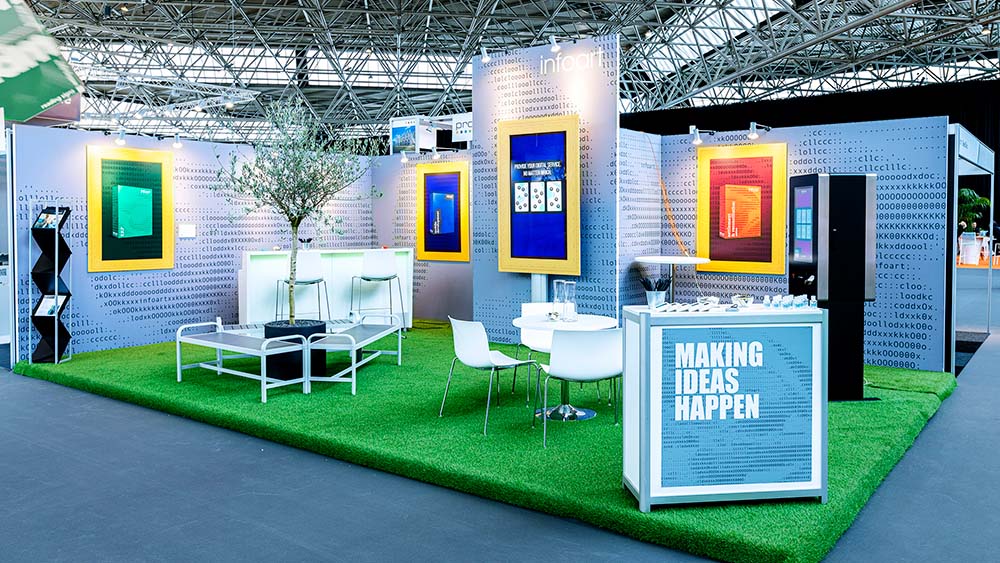
RAI Amsterdam offers clients booth packages that will be reused after their event for the next event, instead of being thrown away. RAI works with Dutch booth contractors to reduce the logistics movements around the facility to help cut greenhouse gases.
It’s now or never. That stark assessment comes from the scientists who authored the most recent update to the Intergovernmental Panel on Climate Change (IPCC) report, released by the United Nations in April. In the report, a panel of 270 experts from 64 countries warned that the goal of limiting global warming in order avoid the worst effects of climate change is impossible without “immediate and deep” emissions reductions across all sectors.
The world has the tools and knowhow required to limit warming and secure a liveable future, but it is time to act, said IPCC Chair Hoesung Lee, a professor who researches the economics of climate change, energy, and sustainable development at Korea University Graduate School of Energy and Environment in Seoul. “We are at a crossroads.”
‘A World on Fire’
Gen Z feels that urgency around climate change keenly, said Ziad Ahmed, the 23-year-old CEO of Gen Z-focused JUV Consulting, which he founded while still a student at Yale University. “Young people have a lot of really righteous reasons to be angry at the world,” he said. “There’s a lot of injustice and there’s a lot of inaction and I think we are rightfully very critical of that. Very close to the top of the list, if not at the top of the list, is anger around climate change. We’re living in a moment where our world is quite literally on fire and we still see so many folks not prioritizing the climate or actively denying that climate change is happening.”

Ziad Ahmed
There is a disconnect between the narrative around sustainability and what it will take to create real change, Ahmed said. “We are seeing a lot of folks resort to rhetoric that is actually not getting us to where we need to be. For a lot of corporations — and a lot of the conferences — the word that’s being used is ‘sustainability.’ But the question I’m asking, and I think a lot of my peers are asking is: Is sustainability the right word? Because sustainability insinuates that we’re trying to sustain something, but the status quo is not sustainable.”
Unlike prior generations, Gen Z is “not satisfied by a swap from a plastic to paper straw or a neighborhood compost pile,” Claire Fennell, a senior partner at JUV, wrote in April on the company blog.Instead, “we must actively regenerate and actively revitalize the planet,” Ahmed said. “What we’re looking for is not just to not make things worse, but to actively make things better. Not making things worse means that we’re still living in this moment — and at this moment the world is on fire.”
Regeneration Revolution
According to a JUV poll, Gen Z is passionate about reversing climate change through individual means, “but more importantly, through collective action.” And according to Wunderman Thompson Intelligence’s 2021 “Regeneration Rising” report, 84 percent of respondents believe that businesses should drive regeneration.
The need to shift toward a regenerative mindset and strategies in the business events industry was the topic of a 72-page report, “The Regenerative Revolution,” released by IMEX and Marriott International in 2020. The report offered evidence for why it makes financial, logistical, and ecological sense to adapt a regenerative model for events using four tenets: design out waste and pollution (focusing on food and trade-show waste and greenhouse gases from transportation); keep products and materials in use (creating generic badges, lanyards, booths, and signage that are not labeled for a specific event so they can be reused); design for inclusiveness and diversity (organizers can use their events and people to catalyze social impact and improve local communities); and regenerate natural systems (minimize travel and promote local supply chains and food networks).
The report often used the standard trade-show booth as a simple example of how the traditional events industry model — take, make, use, and dispose — is ripe for change. Even a stand made from 70-percent recycled materials, often considered to be sustainable, can be improved upon with a regenerative booth made from 100-percent recycled materials that is 100-percent recyclable. In a circular and regenerative model, the goods of today become the resources of tomorrow, the report notes — “the extraction of raw materials and the production of waste can be drastically reduced by recovering, repairing, remaking, reusing, and recycling as many products and materials as possible, repeatedly and in a systematic way.”
Time for Change?
Like the IPCC report, “The Regenerative Revolution” report mixed optimism with a realistic accounting of the challenges ahead. On the plus side, many key opportunities are within reach and do not require major investment or development, the report’s authors wrote. Their research showed that the two top accelerators to change were better education for in-house teams and selecting suppliers that offer more sustainable and regenerative options. The key sectors that are ripe for rapid innovation were identified as food production and service, venue/hotel design and mobility. “The industry professionals and organizations that produce our events, and cities that host them want change,” they wrote. “The big brands are already on a circular race of innovation, and existing solutions already can solve about 80 percent of the problems.”
The minuses: Current industry, business, and government commitments and skills levels are inadequate for the scale of the challenge, the report’s authors said. “Only 12 percent of the 1,500 event professionals responded that their business had an advanced sustainability strategy; 49 percent said they were only just beginning the journey, and 42 percent have not even started considering circularity in their planning.”
Barbara Palmer is deputy editor of Convene.
